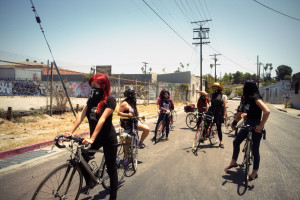More recent news:
USA Today, “China introduces female-only bus service“
“A female-only bus service aimed at protecting women from sexual harassment launched this week in China, drawing praise and criticism.
The Zhengzhou 3rd bus company introduced the service on a popular route in the central city of Zhengzhou. It will run during busy commuting hours until early August.
“During the summer, women usually wear thinner clothes, making it easier for them to be harassed in crowded buses. … The all-female service will increase their convenience and safety,” said Kong Chaoping, the firm’s chairman, according to the Beijing Youth Daily newspaper.
The buses are recognizable by their big red signs that read, “Female-only.” They have stuffed animals and other kids’ toys suspended from the ceiling.
Sexual harassment is a common yet largely ignored problem on China’s public transportation system. More than 50% of women have experienced inappropriate touching or body contact while using the country’s trains and buses, a survey by the China Youth Daily newspaper found last year.
In 2014, the Women’s Federation of Guangzhou, a state-affiliated group, found that 85% of all sexual assaults in Guangzhou, a city in southern China, occurred while victims used the city’s public transportation network.”
Quartz, “Thousands of Mexican women are talking about sexual harassment for the first time“
“Rarely publicly acknowledged in Mexico, sexual harassment is being surfaced via Twitter hashtag #MiPrimerAcoso, or #MyFirstHarassment, by women posting their first experiences with male bullying and by others wanting to have an open discussion. Hundreds of thousands of posts have circulated in the last three days.
The drive, started by a Colombian columnist (link in Spanish) on Saturday, is reinforcing the issue after demonstrations Sunday (April 24) in Mexico City and other major cities attracted thousands of women. The Twitter record, a poignant collection of heartfelt confidences, will probably prove more powerful…
#MiPrimerAcoso reveals that many women first experienced harassment as girls, as young as five and six years old. The perpetrators of the abuse span a wide range, from relatives—older cousins and uncles are mentioned frequently—to policemen, to random strangers, and in one case, a therapist.”
Waging Nonviolence, “Mexican feminists declare a ‘violet spring’ on nationwide day of action“
“Tens of thousands of feminists protested across Mexico on Sunday, amid what they say is an epidemic of violence against women.
“We’re sick of suffering all kinds of abuse when we just walk in the street,” said Mari, a protester in the central Mexican city of Puebla, who was joined by hundreds of activists in Puebla’s city center, demanding justice for victims of femicide.
When the march reached the state government offices, activists accused local authorities of failing to bring perpetrators of violence to justice. One masked protester shouted, “The government here in Puebla lets them get away with impunity,” adding, “This isn’t just in Puebla, but all of Mexico.”
Declaring a “violet spring,” protesters called on women across Mexico to take a stand against sexism. One of the largest protests took place in Mexico City, where organizers railed against Mexico’s traditionally machista, or sexist, culture.
“It is evident that we need social re-education — to teach men not to harass, not violate, not hit, not threaten, not enslave, not abuse and not kill women and girls,” organizers said in a statement.”
The Verge, “India mandates panic button on all phones to help keep women safe“
“All mobile phones sold in India will be required to have a panic button as of next year, the country’s telecommunications ministry announced this week, as part of an effort to enhance safety for women. As Bloomberg reports, the order requires handset makers to implement an emergency feature that could be activated by holding down the numbers 5 or 9 on a keypad. The function will be mandatory on all phones by January 1st, 2017, while GPS navigation systems will be mandatory on all devices by 2018.
Women’s safety in India has drawn worldwide attention following reports of gang rapes and other forms of violence. There were more than 330,000 reported cases of violence against women in 2014, according to government statistics, up 9 percent from the previous year. The issue has spurred some companies to develop apps and services that make it easier for women to contact emergency services. India’s minister for women and child development, Maneka Gandhi, pushed for mandated panic buttons last year.”
‘Technology is solely meant to make human life better and what better than using it for the security of women,’ Communications Minister Ravi Shankar Prasad said in a statement.”
attn: “This Man’s Attempt to Take Upskirt Photos Just Backfired in an Extreme Way“
“A shocking piece of footage, in which a man eats his camera’s memory card after being caught allegedly filming upskirt videos, is gaining international attention.
According to the Chinese Publication People’s Daily, the video was filmed by a woman caught the alleged Peeping Tom in the act while riding the subway. The woman who shot the footage goes by the name Xiao Cha Cha A, Daily Mail reports. She posted the video on the Chinese social media service Weibo, with a caption reading, “I had tried to block his view a few times but he kept on taking them. I must expose him!”
In the video, the Xiao Cha Cha A is seen tugging at the man’s bag, and yelling, “delete the pictures, delete them. Look everybody, here is a pervert who takes upskirt pictures of women,” Daily Mail reports.
The man then eats his SD card. It is unclear if the woman forces him to do so, or if he eats the card voluntarily to destroy the evidence. In the final seconds of the 1:01-long video, the man can be seen fleeing the subway car.”
The Source, “[Los Angeles] Metro’s new anti-sexual harassment video“
“Metro launched its “Off Limits” campaign last spring in an effort to reduce sexual harassment on buses and trains. The campaign was a direct response to riders identifying this as an issue in Metro’s customer surveys.”


